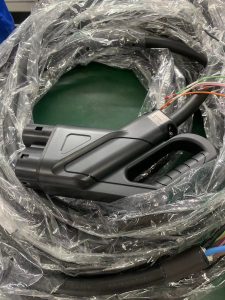As electric vehicles (EVs) become more widespread, the compatibility of charging connectors has become a key concern for owners. Choosing the right charging connector ensures a smooth charging process and prevents potential damage and safety hazards.
How to Determine EV Charging Connector Compatibility
When selecting a charging connector, consider the following key factors to effectively determine compatibility:
1. Understand Your Vehicle’s Charging Connector Type
Each electric vehicle has a specific type of charging connector that determines which charging stations it can use:
Type 1 (SAE J1772): Mainly used in North America and Japan, supporting singlephase AC charging.
Type 2 (IEC 62196 / Mennekes): Widely used in Europe, supporting both singlephase and threephase AC charging.
CHAdeMO: A Japanese standard for DC fast charging, commonly used by brands like Nissan.
CCS (Combined Charging System): Includes CCS1 (North American standard) and CCS2 (European standard), supporting highpower DC fast charging and compatible with Type 1 or Type 2 AC connectors.
Tesla Connector: Tesla’s proprietary charging connector used in the North American market, while Tesla vehicles in Europe use the standard Type 2 connector.
GB/T: The Chinese standard for charging, supporting both AC and DC charging.
To determine the type of connector your vehicle supports, consult the vehicle’s manual, the manufacturer’s website, or inspect the actual markings on the vehicle’s charging port.
2. Check the Charging Station’s Connector Types
Different charging stations may offer various types of connectors. Public charging stations often provide multiple connectors to accommodate different brands and models:
AC Charging Stations: Typically offer Type 1 and Type 2 connectors.
DC Fast Charging Stations: Commonly provide CHAdeMO and CCS connectors.
Before using a public charging station, check if it offers connectors compatible with your vehicle. Most charging station apps or websites list the available connector types.

3. Confirm Charging Power and Current Requirements
Different charging connectors support varying power and current levels. Understanding your EV’s charging power and current limitations is crucial for determining connector compatibility:
Type 1 and Type 2 Connectors: Typically support charging power ranging from 3.3 kW to 22 kW. Check your vehicle’s maximum AC charging power to choose the appropriate charging station.
CHAdeMO and CCS Connectors: Generally support higher power levels, ranging from 50 kW to 350 kW for fast charging. Verify your vehicle’s DC fast charging capability to ensure efficient charging.
4. Use of Adapters
In some cases, adapters can help resolve compatibility issues between different connectors. For example, Tesla owners may need specific adapters to connect their vehicles to nonTesla charging stations. When using adapters, ensure they support adequate power transmission and are fully compatible with both the charging station and the vehicle.
5. Consult Compatibility Lists
Many EV manufacturers and charging network operators provide detailed compatibility lists indicating which vehicles can use which connectors. These lists can help quickly determine connector compatibility and avoid issues during charging.
Regular Maintenance for EV Charging Connectors
To maintain the good condition of EV charging connectors and ensure safe charging, regular maintenance and care are essential.
1. Regular Inspection and Cleaning
Routine Checks: Regularly inspect the charging connector to ensure it is free from dust, dirt, or other debris. Use a clean, dry cloth to gently wipe the interior and exterior of the connector to maintain cleanliness and good contact.
Corrosion Prevention: In humid or salty environments, the charging connector may become corroded. Check for signs of rust or corrosion and use specialized anticorrosion treatments if necessary.
2. Inspect Physical Condition
Check for Damage: Regularly inspect the connector’s appearance for any damage, cracks, or deformation, as these can affect its functionality and safety.
Cable Condition: Examine the plug and cable’s outer sheath for wear, cracks, or aging to ensure they are intact.
3. Proper Usage and Storage
Alignment and Handling: Ensure the charging plug and connector are aligned during connection and disconnection, avoiding excessive force or bending of the plug and cable.
Storage: When not in use, store the charging plug in a dry, cool place, avoiding prolonged exposure to direct sunlight or extreme temperatures to prevent material degradation.
4. Preventing Water and Liquid Ingress
Weather Precautions: Avoid charging in rainy or damp conditions. If charging under such circumstances is necessary, ensure the connector has good waterproof sealing.
Cleaning Care: During vehicle cleaning, prevent water or cleaning agents from splashing into the charging connector to avoid short circuits or corrosion.
5. Maintain Contact Performance
Lubrication: To maintain good contact performance, use a small amount of electrical contact lubricant to ensure the contact points between the plug and connector are smooth and free from wear.
Heat Monitoring: If the charging connector or plug becomes unusually hot during charging, stop charging immediately and check for poor contact or overload.
6. Regular Professional Inspections
Professional Checks: It is advisable to have a professional EV technician inspect and maintain the charging connectors and cables annually or after a certain mileage to ensure they remain in good condition.
Stay Updated: Keep informed about new charging connector technologies and maintenance methods to better maintain your connectors.
Determining the compatibility of EV charging connectors involves considering the vehicle’s connector type, the charging station’s supported connectors, and the charging power and current requirements. By understanding these key factors, owners can more effectively choose and use the appropriate charging connectors.
Regular inspection and maintenance of EV charging connectors can extend their lifespan and ensure the safety and reliability of the charging process. Whether for home or public charging, proper maintenance and usage habits are crucial for the smooth operation of the charging system. This guide aims to help better understand and maintain EV charging connectors, ensuring an efficient and safe charging experience.


